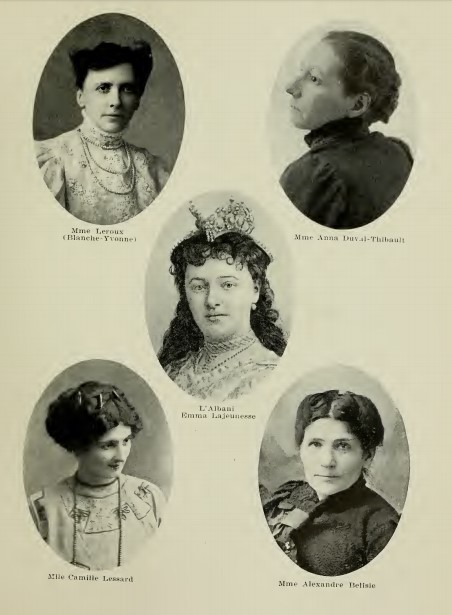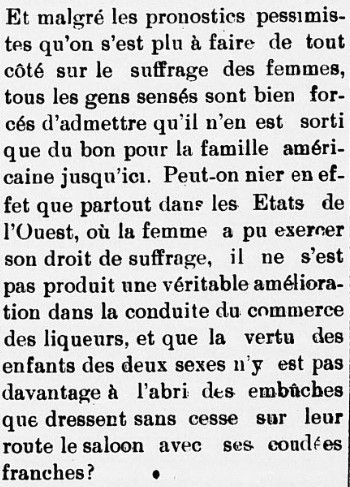This year we mark the centennial of the Nineteenth Amendment, which secured American women’s right to vote across the country. Beginning in the West, some states had begun to admit female suffrage in the late nineteenth century. Only gradually did the notion of equal political rights between men and women gain traction in the Northeast—and that was only for local contests, school board elections for instance.
This process of political emancipation is complicated by social realities that seem to point towards continuity, rather than change, even as women gained access to the ballot box. First, traditional gender roles remained firmly entrenched. Some advocates of female suffrage believed that it would help women guard their traditional concerns, including the well-being of their children and homes and the moral fabric of American society. Second, the achievement of female suffrage did not mark the beginning of women’s political participation. That is especially true if we detach the idea of politics from mere campaigns for public office. Anti-slavery campaigns, the temperance movement, and growing involvement in organized labor helped to establish women as political participants even before they could vote.
Much of this holds for Franco-American women as it did for their Anglo-Saxon or native-born American counterparts, with the caveat that the former were less likely to join social reform movements. Religious and elite discourse exerted more pressure on Franco women and confined them more strongly to household responsibilities. When women stepped outside of that sphere, it was usually to take part in cultural or parochial activities that reproduced the expectations of the domestic realm—circles known as the Dames de Sainte-Anne are a good example.

As we have previously seen on this blog, there were Franco-American female journalists. Setting aside Camille Lessard, however, most of these figures—whether reporters or authors of a page féminine—tended to cement existing views of a French-Canadian woman’s responsibilities. Still, by 1890, there was grudging acknowledgment that women might serve a powerful (though unofficial) function in the achievement of Franco-American influence. There is a glimpse of this in the proceedings of the Connecticut state conventions collected by Arthur Baribault. Two years after his speech in Nashua, New Hampshire, attorney Hugo Dubuque visited the French-Canadian state convention held in Danielsonville, Connecticut. He spoke on the challenge of increasing the rate of naturalization among Canadian immigrants:
When you have succeeded in convincing women, you have thus persuaded men as well. Indifference [to naturalization] may be the result of men’s attitude to an extent, but it certainly comes from women because they do not understand this issue well enough. For instance, following a public meeting in support of naturalization organized by a French-Canadian political club in Fall River, where women were present, 150 people sought to become citizens whereas, ordinarily, we would get but five or six names.
The following year, in Waterbury, a Dr. David added:
The greatest obstacle is the woman, for she does not attend our assemblies or study the issues that interest us. Let’s address women—a delicate task—and try to bring them to do their part in the interest of our cause [naturalization]. Let’s aim to assert that we have made progress at our next convention.
One step forward, one step back. Women were not doing enough. But there was, at least, an elite recognition that larger benefits might follow from involving them in ethnic endeavors.
Of course, this was still a far cry from interest in universal suffrage. An impressive debate performance by Camille Lessard on the issue of women’s right to vote, in 1910, had few tangible effects on public opinion in the Franco-American community.[1] Only as the national conversation about suffrage intensified after 1914 did the Franco press begin to approach the issue seriously. In some quarters there was a public turnaround. For instance, in January 1915, L’Echo de l’Ouest noted that advocates of female suffrage were mostly divorcées and women who were trying to compete with their husbands. By contrast,
In the ranks of those who oppose the political enfranchisement of women, we should count on this side all women who are content with their situation, caring for their children, placing the joys of the hearth over the ephemeral seductions of politics.
A year and a half later, the same paper emphasized the positive effects of women’s political participation in states where suffrage had been extended. Women had mobilized to help regulate the alcohol trade and to protect the traditional family. The editor added:
Is it not obvious that the educated American woman can vote more intelligently on all the major issues of American politics than these hordes of ignorant workers that arrive each year from Europe? In our view, it would be a clear service to the country to give women the right to vote as a counterweight to men without principles who are infesting our cities.
Of course, L’Echo was based in Minnesota and was likely not immune to more liberal currents about women’s rights—just as it purveyed casual xenophobia. But cracks were beginning to appear in the East as well, especially in the wake of the widely-reproduced statements of a Catholic clergyman who explained that there was no official Church position on women voting. Franco-American opinionmakers then recognized the valuable patriotic work done by women during the First World War and accepted that the vote need not mean the abandonment of traditional gender roles.

Whatever pocket of resistance remained, by the time the suffrage amendment was ratified, in 1920, Franco-American leaders were ready get women out to the polls. Some believed that women’s political action would encourage men to stand up to do their duty to a greater extent. A report on New Bedford published in La Presse (Montreal) on October 23, 1920 offered a lengthier explanation:
Since women obtained the right to vote in the United States, the Chamber of Commerce, aided by clergy and national associations, has done commendable work to invite Franco-American women to get registered on voters’ lists. During a special meeting held in September 1920, Asa Auger, Esq., the president, and other orators won a number of new converts to this doctrine. This new situation had initially been greeted with indifference among Franco-Americans, but, with the bill now having force of law, it is best to accept it and make the most of it. That is in fact the wise counsel that Cardinal Gibbons, primate of the Catholic Church in the United States, offered to all American women, including women religious.
J.-Ubalde Paquin stated that “the issue of suffrage, which formerly seemed to us a menace and a danger, will help to save us.” A New Bedford priest added,
If we want to have access to public offices, if we want to see the Franco-American element recognized, if we want our numbers to carry weight, we must utilize the vote to seize all possible benefits to be derived from universal suffrage as sanctioned by the civil authorities of this country.
This is not to say that Franco-American women voted in the same proportion as men. Further, this did not change gender norms. Some leaders continued to argue that feminism (even maternalist feminism) was a dangerous Anglo-Saxon ideology. We must be careful not to overestimate the significance of the Nineteenth Amendment. Nevertheless, the vote proved to be another powerful tool in the gradual emancipation of marginalized groups, one that would pay even greater dividends as gender roles loosened later in the century.
[1] See, on Lessard, Janet Shideler, Camille Lessard-Bissonnette: The Quiet Evolution of French-Canadian Immigrants in New England (1998); Rhea Côté Robbins, “Camille Lessard-Bissonnette, suffragist (1883-1970),” Le Forum (fall 2019), 19, 21; Côté Robbins, Biographical Sketch of Camille Lessard Bissonnette (Biographical Database of NAWSA Suffragists, 1890-1920).
Leave a Reply